I have read some books since Fayne, honest I have! I just haven’t had the bandwidth, as the saying goes, to write them up properly—which is a shame, as some of them have been very good. So here’s a catch-up post, to be sure I don’t let them slip by entirely unremarked.
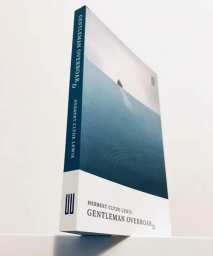 The best of them was undoubtedly Herbert Clyde Lewis’s Gentleman Overboard, which I was inspired to read by listening to Trevor and Paul talk about it on the Mookse and the Gripes podcast. It is a slim little book with a simple little story, but it contains vast depths of insight and feeling, and even some touches of humor, as it follows Henry Preston Standish overboard into the Pacific Ocean and then through the many hours he spends floating and treading water and hoping not to drown before the ship he had been traveling on comes back to pick him up. We also get to see how the folks on board react when he’s discovered to be missing, and we follow his thoughts and memories, learning more about him and how he came to be where he is—not in the ocean, which is easily and bathetically explained (he slips on a spot of grease at just the wrong moment when he’s in just the wrong place), but sailing from Honolulu to Panama in the first place.
The best of them was undoubtedly Herbert Clyde Lewis’s Gentleman Overboard, which I was inspired to read by listening to Trevor and Paul talk about it on the Mookse and the Gripes podcast. It is a slim little book with a simple little story, but it contains vast depths of insight and feeling, and even some touches of humor, as it follows Henry Preston Standish overboard into the Pacific Ocean and then through the many hours he spends floating and treading water and hoping not to drown before the ship he had been traveling on comes back to pick him up. We also get to see how the folks on board react when he’s discovered to be missing, and we follow his thoughts and memories, learning more about him and how he came to be where he is—not in the ocean, which is easily and bathetically explained (he slips on a spot of grease at just the wrong moment when he’s in just the wrong place), but sailing from Honolulu to Panama in the first place.
I just loved this novel, which struck me as elegantly balanced between Standish’s individual experience, written with a pitch-perfect blend of comedy and pathos, and parable-like reflections on life and death more generally. Three small samples, just as teasers, from different moments in the book—one from before Standish’s slip and fall, one from his time in the water, and the other from the perspective of one of his shipboard companions:
The whole world was so quiet that Standish felt mystified. The lone ship plowing through the broad sea, the myriad of stars fading out of the wide heavens—these were all elemental things that soothed and troubled Standish. It was as if he were learning for the first time that all the vexatious problems of his life were meaningless and unimportant; and yet he felt ashamed at having had them in the same world that could create such a scene as this.
Not dead yet, Standish thought. And not alive either; before walking away and leaving his inert remains to shift for themselves it would be best to think of life as he had lived it; not of the ordinary events . . . but of the extraordinary things that had happened in his insufficient thirty-five years. And with each thought a pang came to his heart that had shattered, a pang of regret that he could not go on like other men having new extraordinary experiences day after day.
He went down to his favorite spot on the well deck and gazed out at the sea and the materializing stars in the heaven. It defied his imagination. You could not think of this vastness one moment and then the next moment think of a puny bundle of humanity lost in its midst. One was so much bigger than the other; the human mind simply could not cope with the two together.
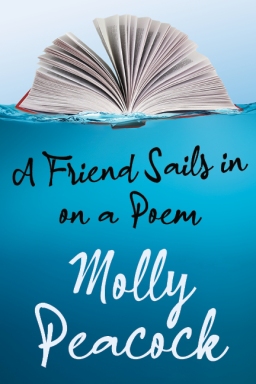 I also really appreciated Molly Peacock’s A Friend Sails in on a Poem, which is an account of her long personal and working friendship with fellow poet Phillis Levin. It is a blend of memoir and craft book, which might not work for every reader, but I found the insider perspective on how poems are created and shaped fascinating and illuminating. Peacock includes some of the poems that she talks about; this was my favorite:
I also really appreciated Molly Peacock’s A Friend Sails in on a Poem, which is an account of her long personal and working friendship with fellow poet Phillis Levin. It is a blend of memoir and craft book, which might not work for every reader, but I found the insider perspective on how poems are created and shaped fascinating and illuminating. Peacock includes some of the poems that she talks about; this was my favorite:
The Flaw
The best thing about a hand-made pattern
is the flaw.
Sooner or later in a hand-loomed rug,
among the squares and flattened triangles,
a little red nub might soar above a blue field,
or a purple cross might sneak in between
the neat ochre teeth of the border.
The flaw we live by, the wrong color floss,
now wreathes among the uniform strands
and, because it does not match,
makes a red bird fly,
turning blue field into sky.
It is almost, after long silence, a word
spoken aloud, a hand saying through the flaw,
I’m alive, discovered by your eye.
Peacock talks often in the book about her interest in poetic form; I liked this explanation of its value:
Form does something else vigorously physical: it compresses. Because you have to meet a limit—a line length, a number of syllables, a rhyme—you have to stretch or curl a thought to meet that requirement. Curiously, as the lyrical mind works to answer that demand, the unconscious is freed to experience its most playful and most dangerous feelings. Form is safety, the safe place in which we can be most volatile.
A Friend Sails in on a Poem is not an effusive book, but there’s something uplifting about its record of a friendship between women that is shaped by shared artistic and intellectual interests and not threatened by the differences between them as people and as writers. There’s no melodrama, not even really any narrative tension, around their friendship; the book’s momentum comes solely and, I thought, admirably simply from the movement of the two poets in tandem through time.
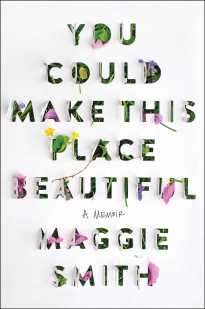 I was more ambivalent about Maggie Smith’s You Could Make This Place Beautiful. At times I found its fragmentary structure annoying in the way I often feel about books that read to me as unfinished, deliberately or not. But I also thought some of the rhetorical devices Smith uses to structure it were very effective, especially her reflections on the questions, usually well-meaning, people have asked her about the breakdown of her marriage, her divorce, and her writing about it: there are the answers she would like to give, typically raw, fraught, and conflicted, reflecting the complexity of her feelings and experiences, which defy straightforward replies; and then there are the answers she does give, neater, shorter, sanitized. That rang true to me, as it probably does to anyone who has been through something difficult and knows that when people ask how you are doing, they are not really, or are only rarely, asking for the real answer.
I was more ambivalent about Maggie Smith’s You Could Make This Place Beautiful. At times I found its fragmentary structure annoying in the way I often feel about books that read to me as unfinished, deliberately or not. But I also thought some of the rhetorical devices Smith uses to structure it were very effective, especially her reflections on the questions, usually well-meaning, people have asked her about the breakdown of her marriage, her divorce, and her writing about it: there are the answers she would like to give, typically raw, fraught, and conflicted, reflecting the complexity of her feelings and experiences, which defy straightforward replies; and then there are the answers she does give, neater, shorter, sanitized. That rang true to me, as it probably does to anyone who has been through something difficult and knows that when people ask how you are doing, they are not really, or are only rarely, asking for the real answer.
Smith’s story also felt very specific, very particular to me. She remarks in a few instances that she is writing it because perhaps it will become something other people can use, but her care not to extrapolate or generalize, while I suppose appropriate to such a personal kind of memoir, seemed to me to work against that possibility. Others might well disagree, and I can see making the argument that the portable value of her book lies precisely in its modeling of how to be honest and vulnerable about something so intimate. In the spirit of her viral poem “Good Bones,” You Could Make This Place Beautiful (a title which itself comes from that poem), Smith’s book is, ultimately, about repair, about how even a situation that seems like a hopeless ruin can, with some time and a lot of effort, become habitable again:
Something about being at the ocean always reminds me of how small I am, but not in a way that makes me feel insignificant. It’s a smallness that makes me feel a part of the world, not separate from it. I sat down in a lounge chair and opened the magazine to my poem [“Bride”], the thin pages flapping in the wind. IN that moment, I felt like I was where I was meant to be, doing what I was supposed to be doing.
Life, like a poem, is a series of choices.
Something had shifted, maybe just slightly, but perceptibly. I remember feeling the smile on my face the whole walk back to the hotel, hoping it didn’t seem odd to the people around me. I stopped at the drawbridge that lifted so the boats could go under. The whole street lifted up right in front of me. Nothing seemed impossible anymore. Everything was possible.
OK, maybe! The optimism is welcome, and maybe authentic, though (and again, others might disagree) it feels a bit forced to me here, whereas “Good Bones” has a quality of wistfulness to it that I like better.
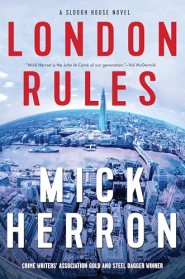 Finally, I just finished Mick Herron’s London Rules, the third (or possibly fourth?) of his Slough House books that I’ve read. It was thoroughly entertaining, and I read it at a brisk pace as a result, but by the end it did strike me as a risk that the series’ signature elements, including Lamb’s flatulence and the various other Slow Horses’ quirks, could wear a bit thin.
Finally, I just finished Mick Herron’s London Rules, the third (or possibly fourth?) of his Slough House books that I’ve read. It was thoroughly entertaining, and I read it at a brisk pace as a result, but by the end it did strike me as a risk that the series’ signature elements, including Lamb’s flatulence and the various other Slow Horses’ quirks, could wear a bit thin.
I’m reading for work too, of course, most recently The Murder of Roger Ackroyd in Mystery & Detective Fiction and a cluster of works on ‘fallen women’ for my Victorian ‘Woman Question’ seminar—DGR’s “Jenny,” Augusta Webster’s “A Castaway,” and Elizabeth Gaskell’s “Lizzie Leigh,” a story I love (I wrote about it here the last time I taught it in person, which seems a lifetime ago). As always, I am thinking about ways to shake up the reading list for the mystery class, if only to bring in at least one book more recent than the early 1990s, which used to seem very current but of course is not any longer. A student asked today, in the context of our discussion of the moral discomfort possibly created by the “cozy” subgenre, whether we were going to talk about true crime in the course. We aren’t, because no example of it is assigned and because the course is specifically about crime “fiction”, but one idea I’ve been kicking around is Denise Mina’s The Long Drop, which is a novelization of a true crime case. I haven’t read it yet, so that’s obviously what I need to do next, but I listened to a podcast episode with her talking about it and it was really fascinating.
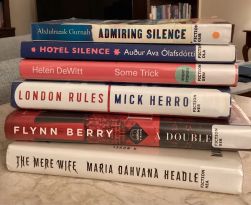 I hope to get back to more regular blogging about books, and about my classes, an exercise in self-reflection that I’ve missed. It has been a very busy and often stressful couple of months, for personal reasons (about which, as I have said before, more eventually, perhaps), but whenever I do settle in to write here I am reminded of how good it feels, of how much I enjoy the both the freedom to say what I think and the process of figuring out what that is! My current reading (slowly, in the spirit of Kim and Rebecca’s #KateBriggs24 read-along, though I am not an official participant) is Kate Brigg’s The Long Form, which I am enjoying a lot; I’m experimenting with having more than one book on the go, as well, so now that I’ve finished London Rules I will go back to my tempting stack of library books and pick another to contrast with Briggs, perhaps Auður Ava Ólafsdóttir’s Hotel Silence, since I liked Butterflies in November a lot. I hope to get through all the books in that stack before they come due—but I know I’m not the only reader who finds that their aspirations of this kind, and the pace of their library holds, can exceed their capacity!
I hope to get back to more regular blogging about books, and about my classes, an exercise in self-reflection that I’ve missed. It has been a very busy and often stressful couple of months, for personal reasons (about which, as I have said before, more eventually, perhaps), but whenever I do settle in to write here I am reminded of how good it feels, of how much I enjoy the both the freedom to say what I think and the process of figuring out what that is! My current reading (slowly, in the spirit of Kim and Rebecca’s #KateBriggs24 read-along, though I am not an official participant) is Kate Brigg’s The Long Form, which I am enjoying a lot; I’m experimenting with having more than one book on the go, as well, so now that I’ve finished London Rules I will go back to my tempting stack of library books and pick another to contrast with Briggs, perhaps Auður Ava Ólafsdóttir’s Hotel Silence, since I liked Butterflies in November a lot. I hope to get through all the books in that stack before they come due—but I know I’m not the only reader who finds that their aspirations of this kind, and the pace of their library holds, can exceed their capacity!
Nice to see you on here Rohan and that your teaching is going well. I haven’t read any of those books apart from Roger Ackroyd when I was teaching crime novels but I like Denise Mina and will give Mick Herron a go. I also noticed a Gurnah, Nobel Prize winner at the end. I loved his book Afterlives and referred to it in an African Novels course I was teaching. Anyway, happy reading to you and my best wishes. Peter
LikeLiked by 1 person
Thanks, Peter. It was the Nobel Prize plus the discussion of another of his novels on One Bright Book that made Gurnah’s name jump out to me as I was browsing.
LikeLike
Talking about ‘aspirations’ and ‘capacity’, I have recently read “The Life of Crime: Detecting the History of Mysteries and their Creators” by Martin Edwards. It is superb for except for the fact that I will need one or two more lifetimes to read the books he introduces. C’est la vie.
Always love reading your blog, Rohan.
LikeLiked by 1 person
This is one of the problems with all the recent re-issues series: as if we don’t have enough books in our TBR piles! :-)
LikeLike
Hi, Rohan. I tried (and failed) to leave a comment on the original post, but I did want to thank you for writing so beautifully last year about the novella “Cold Enough for Snow,” which I just finished. I love that book! It reminded me of a trip to London that my mom and I took in the 1980s. I wouldn’t have heard of it if not for Novel Readings.
LikeLike
I’m sorry about the glitch in getting comments posted: I tinkered with the settings to deal with a spam problem and it seems to have set everything back a bit. I was so glad to find your comment and know that you loved that little book too. Other readers have not found it as tender as I did but for me, it just felt warm at heart. I have had some lovely trips with my own mom, including to London. Isn’t that kind of time together precious?
LikeLike
Any reading is good reading if it helps you through the day, and that goes for writing, too 🙂
LikeLiked by 1 person
I agree on both counts – although for me I try also to do some aspirational reading and writing, or to have some in my plans.
LikeLiked by 1 person
I like the poem, Rohan. As a quilter, I make some mistakes without attempting to, but often design one in, because only God is perfect, and quilters have a tradition of including a purposeful mistake.
Thank you,
Patricia
LikeLiked by 1 person
That’s such a nice idea about the ‘purposeful mistakes’ – I make lots of mistakes in anything I make by hand so maybe I can use this as a cover story. 🙂
LikeLike
In real life Jackson Lamb may not be as far from the truth as Bond or Bourne were but he was a brilliant creation by the excellent author Mick Herron. Nevertheless, it’s worth remembering Pemberton’s People in MI6 were for real and included characters who would have overshadowed the likes of Jackson.
Pemberton’s People included Roy Astley Richards (inter alia Winston Churchill’s bodyguard), Peter ‘Scrubber’ Stewart-Richardson (an eccentric British Brigadier who tried to join the Afghan Mujahideen), Peter Goss (an SAS Colonel and JIC member involved in the Clockwork Orange Plot concerning Prime Minister Harold Wilson) and even the infamous rogue Major Freddy Mace (who featured in Hansard for all the wrong reasons and impudently highlighted his cat burgling and silent killing skills in his CV).
If real scoundrels operating in the dark are your cup of Novichok then read Beyond Enkription in The Burlington Files espionage series about MI6. First though, browse some of the more recent brief news articles in TheBurlingtonFiles website. Soon you’ll be immersed in a world you won’t want to exit.
Beyond Enkription is a fact based spy thriller and a must read for espionage illuminati and cognoscenti as long as you don’t expect John le Carré’s delicate diction, sophisticated syntax and placid plots. Nevertheless, it has been heralded by one US critic as “being up there with My Silent War by Kim Philby and No Other Choice by George Blake”. Little wonder Beyond Enkription is mandatory reading on some countries’ intelligence induction programs.
LikeLike
I sometimes find with divorce stories (and maybe you have found this with grief books) that even if the story is very different from mine, some small thing will be illuminating for me.
I’m so glad you liked A Friend Sails in on a Poem. I’m now in the middle of (or more truthfully paused in the middle of) Story of a Poem by Matthew Zapruder, which is also both a memoir and a craft book. Quite different, but I think you might like it (I am loving it).
Another true crime book to consider might be Michelle McNamara’s I’ll Be Gone in the Dark, which is partly about her obsession with the case. (I haven’t read it, but it got a lot of good press). Or what about fiction that addresses the popularity of true crime? There’s Mina’s Conviction, in which the protagonist hears about a crime she had a connection to on a podcast (I did read that and remember enjoying it, and I think the podcast had an important role). My students and I talked some about true crime when we read The Break, because I think that novel asks us to consider our own position as consumers of crime stories—what does it mean to enjoy them? The ethics of digging up these stories are often fraught. I can imagine some really lively discussion on these issues. Have you seen this SNL skit? https://www.youtube.com/watch?v=J4RdcE6H4Gs
LikeLike
I like these occasional catch-up posts; I’ve taken to writing them myself, as you know.
What you say about Maggie Smith’s book rings true to me, especially about how “there are the answers she would like to give, typically raw, fraught, and conflicted, reflecting the complexity of her feelings and experiences, which defy straightforward replies; and then there are the answers she does give, neater, shorter, sanitized.”
Maybe it’s true that when people ask someone who has lived through something difficult that they aren’t looking for a “real answer.” But maybe some of them already know the broad outlines of that answer and are looking for something less particular–something those two people can share–to build a new relationship on.
LikeLike
That’s a good thought about what people are really trying to say or do with those questions. I know from the ‘other side’ that figuring out what to say or ask, if anything, is such a fraught thing, too.
LikeLike